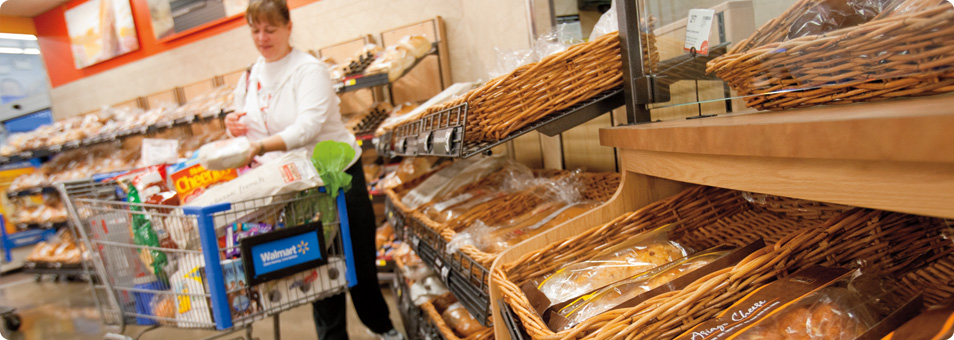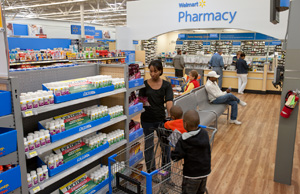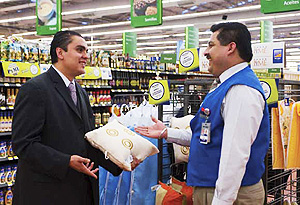
Customer and Community Impact
Wal-Mart serves customers and members more than 200 million times per week around the world who come to Wal-Mart to buy the things they need at prices they can afford. As current economic conditions continue, we know that thousands of men and women are going to start shopping with us for the first time, while our current customers are going to lean on us a little harder. We believe we have a clear opportunity to demonstrate our value to these customers and to our communities.
In our stores, we can offer solutions that help people live better lives. Outside our own four walls, we can demonstrate that we are a good neighbor and a committed partner in communities by doing everything from generating tax revenues and lowering overall prices on goods, to boosting customer traffic at surrounding stores and creating new jobs.
SAVINGS FOR OUR CUSTOMERS
Simply by virtue of the fact that we serve so many millions of customers in thousands of stores around the globe every day, we are closer to working men and women around the world than just about anyone. We understand them and their needs, and we understand just how important it is to provide them with value, convenience and affordability. But most important, we understand the role and responsibility we have as a company to help deliver it to them.
In Our Stores
Independent research from Global Insight has shown that Wal-Mart's U.S. stores save the average American household more than $3,100 per year — whether they shop with us or not. (Global Insight, "The Price Impact of Wal-Mart: An Update through 2007," 2/9/09)
During National Small Business Week, thousands of small business owners participated in invoice comparison exercises at Sam's Club locations across America. These entrepreneurs brought in past invoices from competitors and compared them with our prices. As a result, many of them learned that by shopping at Sam's Club they could save thousands of dollars every year. In addition, our membership team commissioned an independent third-party study in 2008 which showed an overall average savings of about 38 percent on the categories surveyed.
At Our Pharmacies

In a similar vein, our $4 prescription drug program has saved our customers nearly $2 billion since its inception more than two years ago. The program has prompted other pharmacies to lower their prices as well — meaning we are helping men and women across the country save money on their medications, whether they shop in our stores or not. In 2008, the program was expanded to include 90-day supplies of more than 350 prescriptions for just $10, including a number of medications designed to combat chronic conditions as well as for specific women's health needs.
Around the world, our customers appreciate low prices and value on the medications they need to live better, healthier lives. For example, Wal-Mart Brazil's affordable generic pharmaceutical drug program makes medications accessible for customers at an estimated R$9.90 ($5.38 USD) and generated an estimated total savings for customers of more than R$21.5 million ($11.6 million USD) in 2008. In Mexico, Medi-Mart is a line of low-cost prescription drugs that gives our customers access to the medicines they need at prices they can afford. Recently, in alliance with 27 Mexican laboratories, we worked to expand the Medi-Mart catalog to include 456 drugs that treat the most common illnesses affecting Mexican men, women and children. As a result, in 2008 the program generated an estimated 1.6 billion pesos ($143,000 million USD) in savings for these customers — an estimated increase of more than 57 percent from the year before.
From Our Services
In this economic climate, we know that just as it is important for us to help our customers save money, it is important to offer ways to help them manage it as well. In the U.S., Walmart Financial Services helps our customers save on basic money services like check cashing, money orders, money transfers, bill payment and the Walmart MoneyCard, our prepaid VISA debit card at our in-store Walmart MoneyCenters and Service Desks. Today, there are more than 750 Walmart MoneyCenters in operation, representing nearly 20 percent of our Walmart locations in the U.S.
In Mexico, we opened Banco Wal-Mart with the overall mission of providing access to financial services products to the unbanked and the underserved. . By the end of 2008 there were 38 Wal-Mart de Mexico Bank Customer and Member Service Modules (MACS), 394 consumer credit modules and more than 152,000 individual accounts. And we are making a difference: a full 35 percent of our account holders tell us that they have never had any kind of bank account before. We want to continue to use our position in communities and our strengths as a business to serve the needs of the underserved and unbanked around the world.
In Puerto Rico, for example, we are testing the Wal-Mart MoneyCard. Our U.S. stores have been offering MoneyCards since June 2007, but in February 2009, we began offering these reloadable, pre-paid Visa debit cards for just $3 — a savings of more than 60 percent from the original price of $9. With more than 35 million American families underserved by traditional financial institutions, these cards are a way to provide our customers with many of the advantages of a checking account — like being able to deposit their paychecks on a safe and secure card, checking their balances, paying bills and shopping wherever Visa cards are accepted. We expect the MoneyCards to save our customers in the U.S. roughly $50 million every year when compared to similar cards, and we want to bring these same kinds of savings to other markets around the world as well.

JOBS IN OUR COMMUNITIES
Even in the midst of the current economic crisis, our stores created approximately 63,000 jobs around the world in 2008, including more than 33,000 in the U.S. In fact, Wal-Mart regularly creates thousands of jobs — often in communities where they are needed the most — every year. We want to continue to provide these kinds of opportunities in the communities we serve, and we will continue to work to demonstrate the value and potential that a Wal-Mart job provides.
- In Argentina, our stores created more than 830 new jobs in 2008.
- In 2007, Wal-Mart Brazil created more than 4,500 jobs. In 2008, more than 7,100 additional positions became available as we opened 34 new stores and expanded into new parts of the country. In 2009, more than 10,000 new jobs will be generated as a result of the 90 new stores we plan to open throughout the year.
- Wal-Mart Canada estimates that we have created more than 100,000 store and construction jobs since we entered that country in 1994.
- Wal-Mart is one of the largest private employers in Mexico. In February 2009, we announced an 11.8 billion peso ($1 billion USD) investment plan for 2009, which will generate more than 14,500 new direct jobs as a result of 252 new units in our Bodega Aurrerá, Walmart and Superama formats, and our Sam's Club and Suburbia apparel stores. The construction of these new stores will support the creation of an additional 25,000 indirect jobs in Mexico.
- In Central America, we have more than 30,000 associates. We created 2,000 new jobs during 2008 alone.
- Wal-Mart is one of the largest employers in Puerto Rico with nearly 14,000 associates. We created nearly 800 new jobs just this fiscal year. Last year, Wal-Mart Puerto Rico received the President's Award from the Puerto Rico Products Association for its contributions to job creation on the island.
- In 2008, through our Bharti Retail joint venture and our cash-and-carry operations there, 395 new jobs were created in India.
- In January 2009, ASDA announced that it would add 7,000 jobs in the United Kingdom and recruit 3,000 long-term unemployed individuals for existing positions. A full 3,700 of these jobs will be created at nine new food stores, five new non-food retail outlets and expansions of 15 other stores.
- Local Chinese nationals manage 100 percent of our Wal-Mart stores in China, and approximately 75 percent of the store management team have been promoted from within.
OPEN DOORS FOR OUR SUPPLIERS
We do business with more than 100,000 suppliers. We recognize that we have a role and responsibility to leverage our stores and our presence in thousands of communities to help these men and women grow their businesses and create new markets for their products. We believe this is one way we can positively impact the communities we serve and help people all around us live better lives.
For example, Wal-Mart China has a goal of engaging 1 million local farmers in its direct-farm program by 2011. Today, we work with nearly 100,000 Chinese farmers who farm 25,000 acres of farmland to supply our stores in the region. In Japan, 300 of our nearly 400 Seiyu stores have special sections allocated for fresh produce delivered daily by local growers.
In Central America, our stores in Guatemala, Honduras, Costa Rica, El Salvador and Nicaragua support Tierra Fertil, a program to help local producers learn new agricultural techniques that allow them to produce high-volume, high-quality products for the retail market. Through this program, it is estimated that we have helped create more than 4,300 jobs with 5,300 farms, impacting more than 9,700 families in the region. As an example, in Nicaragua, a workforce of 50 growers and an offering of four products grew to more than 400 working with more than 215 products for local consumption or export in just a few years. Today, 90 percent of the current demand for fruits, vegetables and grains at our Pali and La Unión stores in Nicaragua is covered through local production.

Wal-Mart Brazil's Producers' Club program helps small and medium-sized farmers commercialize and open new markets for their products. The initiative supports communities, provides customers with more high-quality, local goods at competitive prices, and promotes sustainable practices as well. Currently, more than 2,800 families take part in the Producers' Club in six Brazilian states: Paraná, Santa Catarina, Rio Grande do Sul, Bahia, São Paulo and Sergipe. As a result of this program and others, in 2008, our stores around the world sold more than R$750 million ($330 million USD) in Brazilian products — an increase of 4 percent from the previous year.
Beyond agricultural suppliers, we also work with businesses of all shapes and sizes to supply our stores with the kind of merchandise we need to be relevant to our broad and diverse customer base. In Argentina, for example, more than two dozen companies have joined our "Pyme" program for smalland medium-sized suppliers in the Buenos Aires, Tucuman, Salta and Santiago del Estero provinces. Through this program and others in provinces across the country, we help local companies become more productive, regional suppliers. Today, 154 of these enterprises are currently selling their products in Wal-Mart stores.
In 2007 alone, Wal-Mart Canada conducted more than $11 billion ($10.2 billion USD) in business with more than 6,000 Canadian suppliers. We have also conducted 10 local supplier fairs in Canada over the past three years to build on our relationships with Canadian suppliers and to expand our range of local products.

In January 2008, Wal-Mart de Mexico, in alliance with the Secretary of Economy, state governments, the United Nations Development Program (UNDP) and Canacintra, a non-profit organization representing the industrial sector, launched a strategic initiative to establish the small and medium-sized enterprise (SME) Supplier Development Program, to drive production chains and strengthen the internal market. We also have a program, called "Adopt-an-SME," through which buyers commit to work with these enterprises for 18 months to help them bring their products to our shelves. In 2008, 104 suppliers were "adopted," and their products produced sales of more than 556 million pesos ($49.8 million USD), an increase of 26.5 percent in a single year. Additionally, these suppliers increased their profitability by 16 percent and their sales floor presence by 28 percent in 264 of our stores. A major priority of the Wal-Mart de Mexico Foundation involves supporting productive projects of rural and indigenous communities with resources and training to help them market, transport and sell their products in our stores. In 2008, total purchases from more than 50,000 of these products exceeded 2.1 million pesos ($188,000 USD), supporting craftsmen in 62 communities and benefitting more than 5,600 indigenous men, women and children.
Likewise, Wal-Mart Puerto Rico is helping small and medium-sized businesses through an alliance with the Puerto Rican Minority Business Enterprise Center, providing business seminars through our Sam's Club Business Member Support Center. Along with the Puerto Rico Products Association, Wal-Mart Puerto Rico is also a major sponsor of the "Find the Stamp" awareness campaign, designed to promote consumption of local products. During 2008, we exported $7 million in Puerto Rican-manufactured products to our stores around the world.
In Central America, we have created a Private Brand Development Program that is helping us establish closer relationships with our customers and allowing us to offer them a wider assortment of high-quality products at low prices. This program has also become an important source of income for a number of small and medium-sized companies in the region. In fact, during 2008, our private-brand products were produced by 146 suppliers, 98 of which were small and medium-sized companies. Working with these suppliers, we help them make continual improvements in their manufacturing processes and procedures, focusing on areas like new product development and sustainable business practices.
Though Bharti-Wal-Mart has only been in India through a Joint Venture with Bharti Enterprises for a short time, in the nine month period from March through November 2008, Bharti Retail sourced more than $4.5 million (USD) in merchandise from a number of local suppliers there, including farmers. In the soft-lines category — meaning items like clothing, bedding and home décor — Bharti-Wal-Mart sourced between 70 and 80 percent of our merchandise from suppliers who employ a large number of skilled and unskilled workers and whose annual revenues are less than $6 million (USD).




